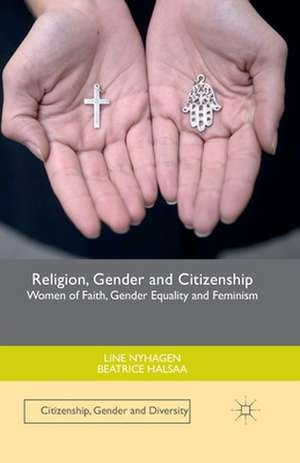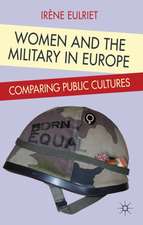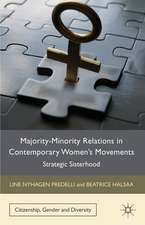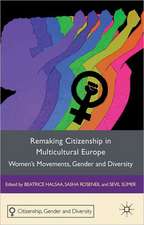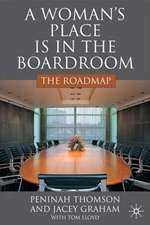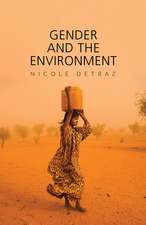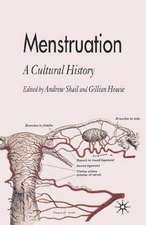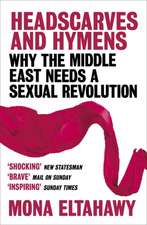Religion, Gender and Citizenship: Women of Faith, Gender Equality and Feminism: Citizenship, Gender and Diversity
Autor Line Nyhagen, B. Halsaaen Limba Engleză Paperback – 23 aug 2019
| Toate formatele și edițiile | Preț | Express |
|---|---|---|
| Paperback (1) | 213.20 lei 43-57 zile | |
| Palgrave Macmillan UK – 23 aug 2019 | 213.20 lei 43-57 zile | |
| Hardback (1) | 477.97 lei 38-44 zile | |
| Palgrave Macmillan UK – 24 mar 2016 | 477.97 lei 38-44 zile |
Preț: 213.20 lei
Nou
Puncte Express: 320
Preț estimativ în valută:
40.81€ • 44.34$ • 34.30£
40.81€ • 44.34$ • 34.30£
Carte tipărită la comandă
Livrare economică 21 aprilie-05 mai
Preluare comenzi: 021 569.72.76
Specificații
ISBN-13: 9781349680689
ISBN-10: 1349680680
Pagini: 271
Ilustrații: X, 271 p.
Dimensiuni: 140 x 216 mm
Greutate: 0.33 kg
Ediția:1st ed. 2016
Editura: Palgrave Macmillan UK
Colecția Palgrave Macmillan
Seria Citizenship, Gender and Diversity
Locul publicării:London, United Kingdom
ISBN-10: 1349680680
Pagini: 271
Ilustrații: X, 271 p.
Dimensiuni: 140 x 216 mm
Greutate: 0.33 kg
Ediția:1st ed. 2016
Editura: Palgrave Macmillan UK
Colecția Palgrave Macmillan
Seria Citizenship, Gender and Diversity
Locul publicării:London, United Kingdom
Cuprins
1. Faithful women: Religious women in Norway, Spain and the United Kingdom talk about faith, citizenship, gender and feminism
2. Binaries and complexities in the study of religion, gender, feminism and citizenship: Towards lived religion and lived citizenship
3. Religious identities and meaning-making
4. Religion and citizenship as lived practice: Intersections of faith, gender, participation and belonging
5. Religion and gender equality
6. Women's Movements and Feminism
7. Faithful women: Lived religion and citizenship, gender equality and feminism
2. Binaries and complexities in the study of religion, gender, feminism and citizenship: Towards lived religion and lived citizenship
3. Religious identities and meaning-making
4. Religion and citizenship as lived practice: Intersections of faith, gender, participation and belonging
5. Religion and gender equality
6. Women's Movements and Feminism
7. Faithful women: Lived religion and citizenship, gender equality and feminism
Recenzii
“Religion, Gender and Citizenship is an important intervention in the topic of religious women and their everyday lives. It does not rely on religious texts or rituals to reach conclusions, but rather takes an honest look at religious woman from three European countries … . The book does an excellent job of demonstrating how women negotiate citizenship, belonging, faith and the issue of how to relate to both women of different faiths and secular women.” (Haje Keli, LSE Review of Books, blogs.lse.ac.uk, April, 2018)
“This book is based on a comparative study of Christian and Muslim women in Norway, Spain, and the United Kingdom. It is a result of research conducted within the research project ‘FEMCIT: Gendered Citizenship in Multicultural Europe: The Impact of Women’s Movements’. …Nyhagen and Halsaa have provided a fascinating and thorough analysis of how Muslim and Christian women in three European countries view citizenship, religion, and gender. …Foranyone interested in these issues, this book is a must-read.” (Inger Furseth, NORA - Nordic Journal of Feminist and Gender Research, Vol. 25 (3), October, 2017)
“The authors adopt a kind of sociological detachment from the views of their participants, showing the variety and complexity of their views … . In conclusion, I can thoroughly recommend this absorbing book. It employs a wealth of subtly analysed empirical material to address a topic that has long been uncomfortable for feminists, and yet one which demands our attention in an age when religion is increasing rather than declining in political significance.” (Dave Elder-Vass, The Sociological Review, Vol. 65 (2), May, 2017)
“Because of growing religious diversity in many countries in the world, religion has gained much attention in the research of various disciplines. … Their analysis contributes to a more nuanced understanding of women and religion in Europe. … political scientists, gender researchers, and sociologists, but also readers mainly interested in theology, religious studies, or diaconal studies can learn a lot by reading this book.” (Annette Leis-Peters, Diaconia, Vol. 8, 2017)
“The volume Religion, Gender and Citizenship by Line Nyhagen and Beatrice Halsaa is an inspiring illustration of cross-national and comparative research onreligion and gender. … Applying an intersectional awareness, the authors demonstrate that not only religion and gender but also race/ethnicity are important aspects of the identities and experiences of religious women. … Religion, Gender and Citizenship is therefore crucial literature for scholars engaged in the sociological and anthropological study of religion and gender.” (Nella van den Brandt, Tijdschrift voor Genderstudies, Vol. 20 (4), 2017)
Notă biografică
Line Nyhagen is Reader in Sociology at Loughborough University, UK. A sociologist and political scientist, she researches gender within historical and contemporary religious contexts focusing on Christianity and Islam, as well as feminism and ethnic relations within the contexts of social movements and public policy.
Beatrice Halsaa is Professor in Gender Studies at the Centre for Gender Research at the University of Oslo, Norway. A political scientist, she researches the institutionalization of gender equality politics in Norway, the history of women's and gender research, feminist utopias, as well as feminism and ethnic relations within the contexts of social movements and public policy.
Beatrice Halsaa is Professor in Gender Studies at the Centre for Gender Research at the University of Oslo, Norway. A political scientist, she researches the institutionalization of gender equality politics in Norway, the history of women's and gender research, feminist utopias, as well as feminism and ethnic relations within the contexts of social movements and public policy.
Textul de pe ultima copertă
Through interviews with Christian and Muslim women in Norway, Spain and the United Kingdom, this book explores intersections between religion, citizenship, gender and feminism. How do religious women think about citizenship, and how do they practice citizenship in everyday life? How important is faith in their lives, and how is religion bound up with other identities such as gender and nationality? What are their views on 'gender equality', women's movements and feminism? The answers offered by this book are complex. Religion can be viewed as both a resource and a barrier to women's participation. The interviewed women talk about citizenship in terms of participation, belonging, love, care, tolerance and respect. Some seek gender equality within their religious communities, while others accept different roles and spaces for women. 'Natural' differences between women and men and their equal value are emphasized more than equal rights. Women's movements are viewed as having made positive contributions to women's status, but interviewees are also critical of claims related to abortion and divorce, and of feminism's allegedly selfish, unwomanly, anti-men and power-seeking stance. In the interviews, Christian privilege is largely invisible and silenced, while Muslim disadvantage is both visible and articulated. Line Nyhagen and Beatrice Halsaa unpack and make sense of these findings, discussing potential implications for the relationship between religion, gender and feminism.
